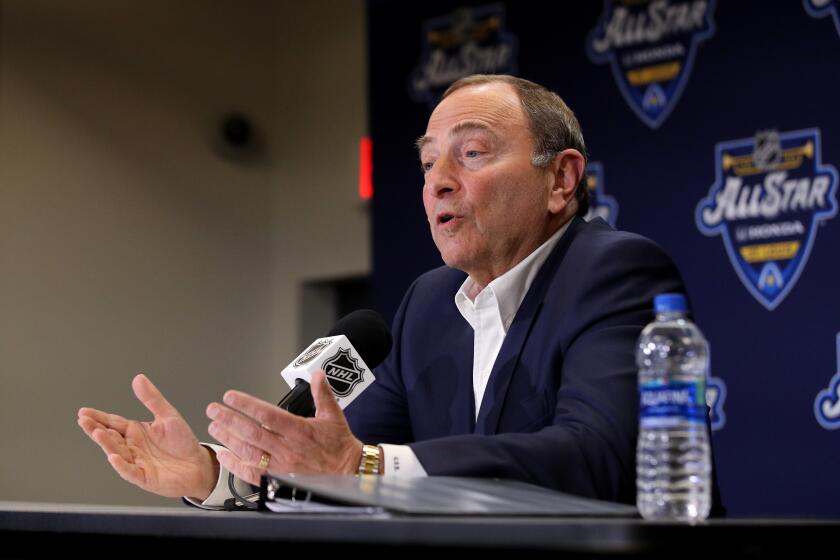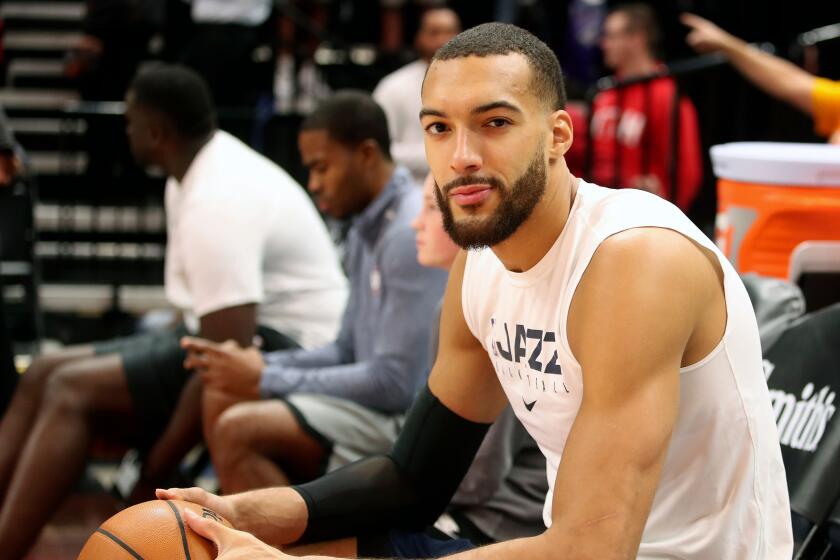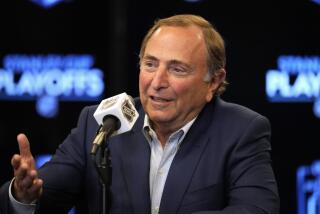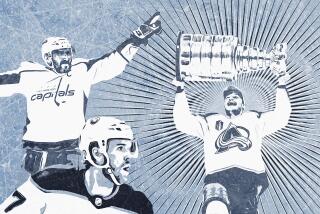NHL observations: Season ‘pause’ because of the coronavirus has an unpredictable aura
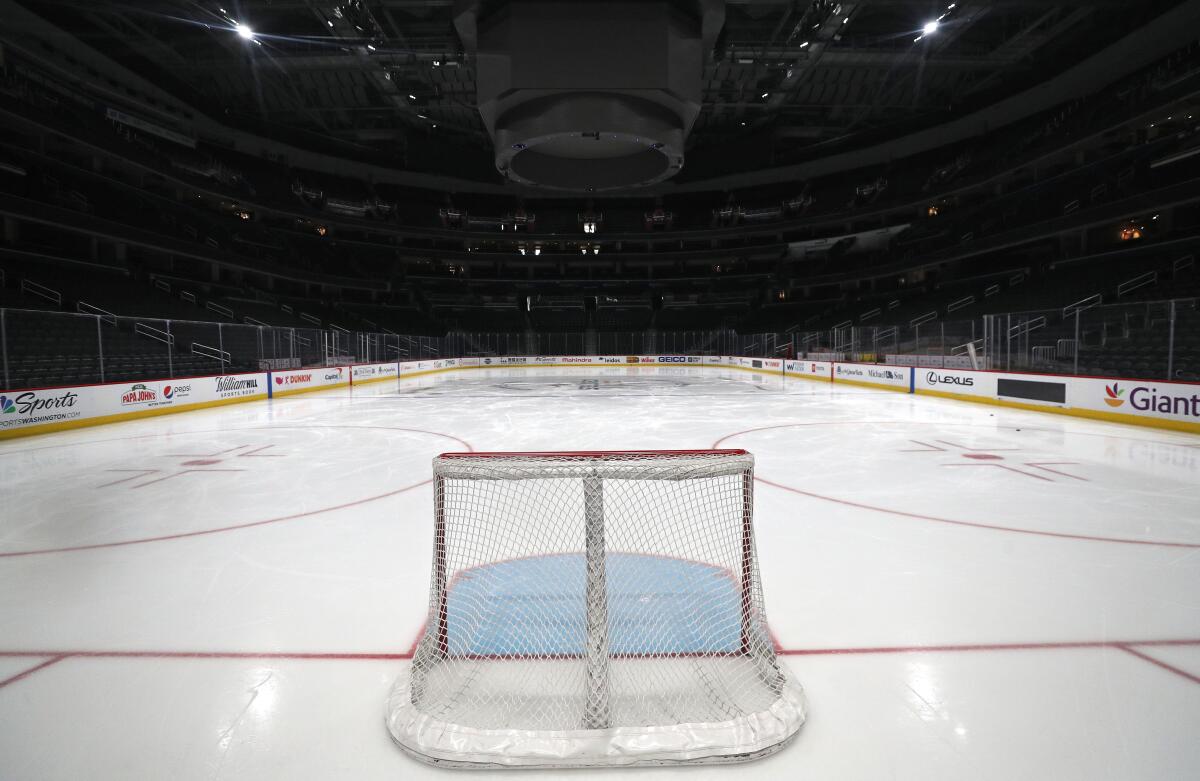
- Share via
Eleven games were on Saturday’s NHL schedule. In one of them the Kings, whose kids and veterans had found a successful balance during a seven-game winning streak, were going to host the Ducks at Staples Center. Both teams were out of playoff positions, but pride and history always bring emotions to their matchups.
But there are no games today. An eerie silence has fallen upon the NHL, the other major professional sports leagues in North America, and many other leagues around the world.
When the NHL locked players out in 1994, in 2004 — sacrificing the season to get a salary cap — and again in 2012 it was easy for fans to be angry at one side or the other or both. They could criticize owners for being greedy or denounce players for being privileged, but they knew play would eventually resume and everything would return to normal. It did, and fans returned in droves.
The “pause” invoked Thursday by Commissioner Gary Bettman in response to the coronavirus pandemic feels different. This is more ominous, less predictable than the blustery verbal salvos of labor negotiations. The league and the NHL Players’ Assn. on Friday advised players to self-quarantine at home for about a week to minimize their chances of becoming ill or spreading the virus.
We’ve taken a detour out of the insular world of hockey and into an unfamiliar region of the Twilight Zone.
Commissioner Gary Bettman, who suspended the NHL season this week because of the coronavirus pandemic, believes the league can finish the season in a sensible way.
Unlike the lockouts, there’s no one to blame for this. There’s also no idea when the NHL, which must heed the guidance of public health officials in the United States and Canada, will be allowed to restart. If it does, the first few games could be played without fans in diligently disinfected arenas.
Instead of debating whether Edmonton’s Leon Draisaitl should win most valuable player honors over teammate Connor McDavid or if Colorado defenseman Cale Makar will top Vancouver’s Quinn Hughes for rookie of the year, we’re now wondering if we’ve seen the final NHL games this season.
Bettman hoped to keep going as long as possible and had made plans for teams to play without fans in the buildings. Everything changed when Rudy Gobert of the Utah Jazz tested positive for the coronavirus Wednesday and the NBA screeched to a halt.
At that moment, Bettman told the NHL Network on Friday, “It occurred to me quite vividly that it was highly unlikely that we were going to get through the rest of our season without a player testing positive, and I wanted to then get ahead of a scene like the NBA had on Wednesday night and simply stop things and pause so that we could wait to see how the pandemic plays out. ...
“I just decided in light of the fact that this pandemic seems to be affecting more and more people, and the more people you interact with the more likely it is you’re going to come in contact with it, and the fact that two of our teams occupied the locker rooms within 24 hours in the last week of the time the Utah Jazz did, again, the likelihood that we were going to have a player test positive was only going to increase the longer we played.”
The NHL board of governors signed off on it during a conference call Thursday afternoon.
A memo sent Friday on behalf of the NHL and the NHL Players’ Assn. to players, teams and agents outlined the next possible steps, according to a person familiar with the memo but not authorized to speak about it publicly.
Players will receive the last three paychecks they were due. They can’t work out at team facilities, but starting Saturday, injured players were allowed to visit those facilities for treatment. If no players or staffers test positive in the coming week, players would then be allowed to train at their team’s rink in small groups and, perhaps, to skate.
If all continues to go well, the NHL would set a date to restart and set parameters for a mini-training camp.
Bettman on Friday offered an optimistic if vague outlook about what’s to come and whether games now classified as postponed can be played. “I believe that in a credible, sensible way we’ll be able to, at some point, complete the season and get through the playoffs and award the Stanley Cup,” he said. “I don’t see how I could set a timeframe one way or the other.”
Stretching the season past late June is an option, but it gets complicated. Warmer weather and summer humidity make it difficult to maintain good ice, even in northern cities. Also, the annual NHL awards show is scheduled for June 17; the draft, on June 26-27; and free agency, for July 1.
“When can we hold the draft? If we can’t hold the draft, do we do a conference call? Do we move the awards show? There’s no shortage of things for us to be considering which we’re doing and analyzing,” Bettman said. “But they’re all contingencies because we don’t know when and we don’t know the circumstances.”
There are some sticky situations to resolve if the NHL jumps directly to the playoffs. Winnipeg holds the first wild-card spot in the Western Conference with 80 points in 71 games, but Nashville and Vancouver, each with 78 points in 69 games, have better points percentages (points earned divided by possible points).
In the East, Columbus has the second wild-card spot with 81 points in 70 games (.578). The New York Islanders trail the Blue Jackets by a point but have a better points percentage (.588). What happens in those situations?
Also, Draisaitl likely would win the scoring title, with a 13-point lead over McDavid, but Washington’s Alex Ovechkin and Boston’s David Pastrnak are tied for the Rocket Richard trophy (most goals) with 48 each. Who would win?
The Carolina Hurricanes’ play-by-play broadcaster is in self-isolation after staying in same hotel room as Rudy Gobert, who was diagnosed with coronavirus.
The NHL will take an enormous economic hit no matter what happens, because it depends more on gate revenues than the NBA, NFL, and Major League Baseball do. Initial NHL revenue projections for this season were $5 billion; if there are no more games, the number could be $4 billion.
The escrow on players’ paychecks — the amount withheld to get a 50-50 split of hockey-related revenues between players and owners — is 14%. It’s adjusted at the end of the hockey season, and players usually get a small portion back. This year, they might instead have to give up an extra 5%.
There’s other fallout, notably the pain inflicted on those who depend on jobs as vendors, ushers, maintenance workers, and other roles. It’s reassuring to see the Ducks, Kings, Detroit Red Wings, Florida Panthers, New Jersey Devils, Philadelphia Flyers, Pittsburgh Penguins, San Jose Sharks, Tampa Bay Lightning and Capitals have made plans to pay their workers for lost shifts.
The Buffalo Sabres said Saturday they’ll pay workers if games are canceled, but so far games have only been postponed. The Calgary Flames told hourly and event employees they won’t be paid for canceled shifts. Remember that the next time those teams want tax breaks.
The stoppage also affects players’ pursuit of milestones and records, including Ovechkin’s chase of Wayne Gretzky’s NHL record of 894 goals. Ovechkin‘s 48 goals in 68 games this season gives him 706 for his career, ranking him eighth. He will be 35 in September and every unplayed game reduces his odds of catching Gretzky.
So far no NHL player, coach or staff member is known to have tested positive for the coronavirus. One positive test — with the need to trace back and notify others that person came in contact with — could end the season.
So we sit and wait, hoping we can exit the Twilight Zone with nothing more to show from the journey than a few spare rolls of hoarded toilet paper.
More to Read
Go beyond the scoreboard
Get the latest on L.A.'s teams in the daily Sports Report newsletter.
You may occasionally receive promotional content from the Los Angeles Times.

